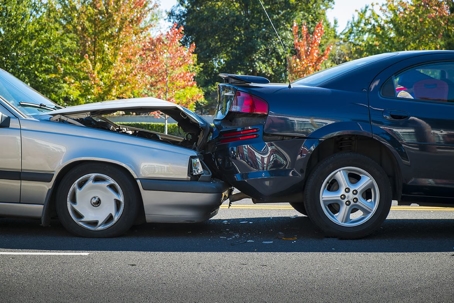You had a car crash. You are at the scene and traffic is stopped. In California what do you do?
There are no rules that say your safety is put aside. Whether you have to drive, walk or run, you are legally allowed to get out of harms way. Normally this means you stop and assess the danger. Police officers were tell you that getting out of your car and moving or driving away when you are highly upset can be dangerous. If the accident is serious and certainly if there are injuries call 911. If the accident is serious you need to stop serious bleeding and restore heart function and breathing per either CPR if you are trained or per the 911 operator instructions if you are not trained.
Once the scene is stable you and the other driver should not focus on who is at fault because you will not resolve that issue at the scene. You exchange names, addresses, telephone numbers, and driver's license numbers from all drivers involved, even those who are not at fault. It is smart to take a picture of the other people, their cars and license plates.
From an attorney point of view pictures of the accident scene, cars, witnesses and weather conditions helps. If you can get names and phone numbers of witnesses, that can be very useful.
After the accident you must make a report to your insurance company or you can lose your right to coverage. A rule that is rarely followed is that if anyone is injured in the accident or if there is damage to any car above $750.00, a report must be made to the Department of Motor Vehicles within 10 days.
First Danger
Exchanging insurance information is required by law. We have had several cases where information was exchanged and the other driver called the police and claimed there was a hit and run. This gave that driver the advantage of creating a false narrative of the accident to their advantage. In one instance the offending driver was a lawyer who made the false claim while the lawyer's victim was off to the side of the road suffering from a head injury! (We sued of course). Make certain that you use your cell phone and take a picture proving you exchanged information.
What do you tell your OWN Insurance Company?
Be careful when you get a call from an insurance company. Is it your company? Keep in mind that “your” company can also be “their” company. You do have to tell your auto insurance company what happened. They can record you. This is a time to be factual and not nice. Don’t be understanding of the other driver. Just be factual. We prefer that you consult your attorney before you speak to your insurance company. We can be with you when you make your statement, even if it is done by telephone.
The interaction with your insurance company is necessary and it is also the first and main step in getting your car fixed. The insurance company will send an adjuster to look at your car and give an estimate of the repair cost. Most lawyers will assist in negotiating this amount (or at least making sure you are being offered a fair settlement. Usually there is no charge by the accident attorney for the car damage negotiation. You need to obtain photographs of the damage to your car especially if there is damage to the frame or serious damage that shows significant impact at the time of collision. If your case does not settle easily expert witnesses will look at the damage photos and scientifically determine the speed of the vehicles at the time of impact. In certain cases our investigators will actually measure and document the damage or we will send a qualified expert to do his/her own inspection prior to repair.
The car settlement is generally either the cost to repair or the actual cash value (ACV) of the car. Actual Cash Value in California means fair market value. The fair market value of an item is the dollar amount that a prospective buyer and seller are willing to pay and are reasonably knowledgeable about the asset.
One problem is when the car loan is larger than the total actual cash value. We can help negotiate in those situations (again without charge).
In many cases the insurance company will help you recover your deductible. If the insurance company seeks subrogation that means whatever they paid to you is their loss but they will try to make the other driver pay them to make them whole. When your insurance company pursues subrogation, they are required to include your deductible as a part of the process. So they go to work for you to make the other driver pay your deductible.
The major portion of a car accident case is the physical injury and additional loss portion. How much time have you lost from work? Is your car worth less now that it has been fixed but CARFAX shows that it has been in an accident? Does your neck hurt? Did you suffer a concussion? Is there damage to your spine that may not show up for a few weeks or even months? How much compensation can you get for this? What is fair?
Do You Need a Personal Injury Lawyer?
These large damage personal injury issues require review by a qualified accident attorney. The sooner you get representation the better. Our lawyers tie down fault, document car damage and document your injuries. Lots of evidence can be lost over time. Daniel Horowitz’ office is located in Lafayette, California (Contra Costa County). His accident practice spans the Bay Area and there is never a legal fee unless and until you actually recover.

